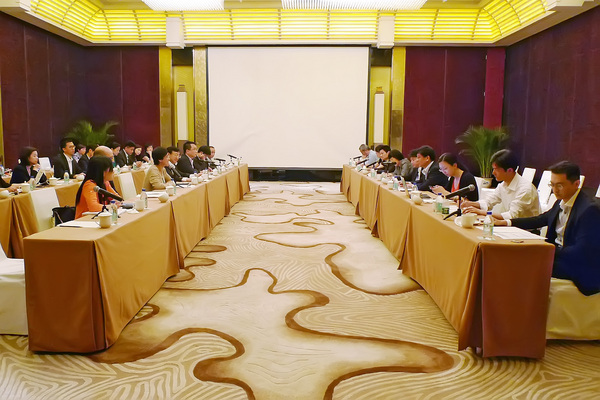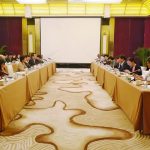
The 8th Asia Pacific Economic Cooperation (APEC) Tourism Ministerial Meeting, hosted by the National Tourism Administration (CNTA) and organized by the Macao Special Administrative Region Government, will be held in Macao in September. A government delegation, led by the Chief-of-Cabinet of the Office of the Chief Executive, Mr Alexis Tam Chon Weng, visited Sanya in Hainan Province for a co-ordination meeting to discuss with CNTA the details of the ministerial meeting to ensure its smooth running. The delegation arrived at Sanya on 25 April and was greeted by the Vice Chairman of the CNTA, Mr Du Jiang, in the afternoon at their resort hotel. Mr Du expressed his warmest welcome to the delegation's participation in the meeting in Hainan and full support to the Macao SAR Government in organizing the Tourism Ministerial Meeting and Mr Tam expressed his gratitude to the CNTA for their full support to Macao in organizing the meeting. Mr Tam said the 8th APEC Tourism Ministerial Meeting is one of the most important tasks of the Government this year. The organizing committee, formed in Macao, is now implementing all preparation works. It is hoped that the meeting would further enhance Macao's international status and influence, and promote Macao as a worldwide tourism and leisure center. At the co-ordination meeting this morning, the Director General of the Department of Tourism Promotion and International Communications, Mr Li Shihong, introduced the latest progress of CNTA's preparation for the meeting, while Mr Tam and the Director of the Macau Government Tourist Office, Ms Maria Helena de Senna Fernandes, reported on Macao's progress. During the two-hour co-ordination meeting, the parties discussed in-depth topics including protocol, media coverage, security, publicity and promotion, and preliminarily confirmed the proposal for each activity, achieving expected outcomes. The Macao delegation members attending the meeting led by the Chief-of-Cabinet of the Office of the Chief Executive, Mr Tam Chon Weng included Ms Senna Fernandes; the Director of the Government Information Bureau, Mr Victor Chan; the Director of the Protocol, Public Relations and External Affairs Office, Mr Fung Sio Weng; the Advisor to the Secretariat for Social Affairs and Culture, Mr Ng Peng In; and the Chief Constable (Crime) of the Public Security Police, Mr Ng Kam Wa. Representatives from the CNTA included the Director General of the Department of Tourism Promotion and International Communications, Mr Li Shihong; the Deputy Director of the Department, Ms Zhang Xinhong; the Head of the Research Division, Mr Xu Haijun; the Head of the Publicity Division, Mr Zhou Wenjie; the Head of the External Affairs Division, Mr Wang Jianshe and the Director of International Relation Division, Mr Feng Litao. Established in 1989, APEC, which currently has 21 members, is the highest level and most influential regional economic organization in the Asia-Pacific region. After hosting the 9th APEC Informal Leadership Meeting in Shanghai in 2001, China is again responsible for organizing the APEC Informal Leadership Meeting and its related ministerial meetings in 2014. The Macao SAR will host the 8th APEC Tourism Ministerial Meeting in September this year. With China once again hosting APEC after 13 years, it is of great significance for Macao to host the upcoming APEC Tourism Ministerial Meeting. This will be the highest level multilateral economic summit hosted by China under its new leadership. This is also the first time the APEC Tourism Ministerial Meeting is held in China. The choice of Macao as the venue for the meeting reflects the full support of the Central People's Government for the Macao SAR Government.


